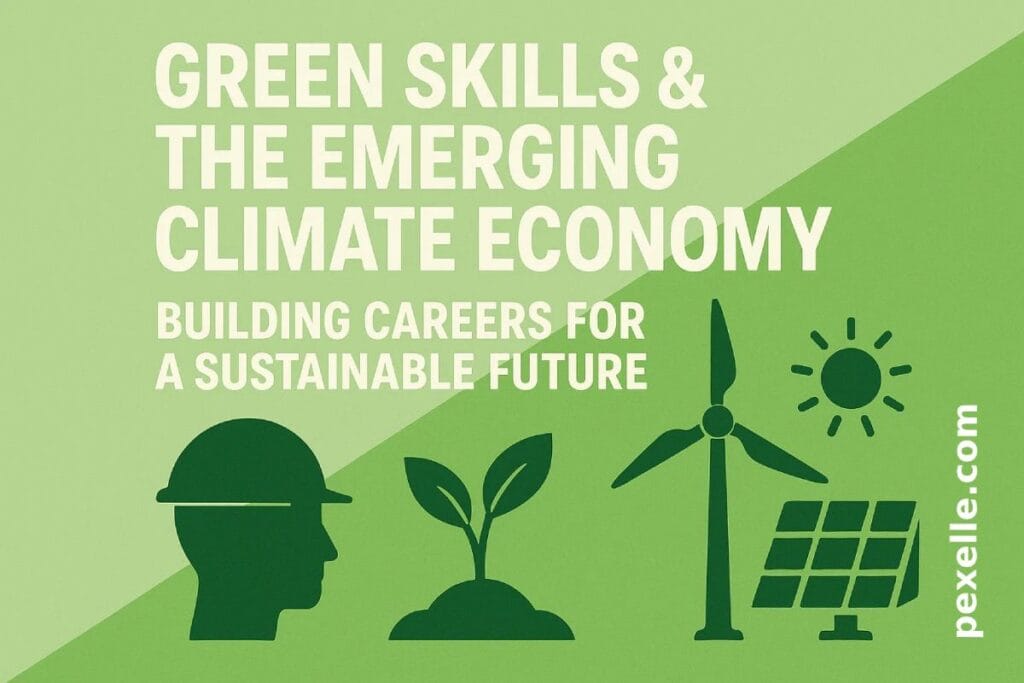Green Skills & the Emerging Climate Economy: Building Careers for a Sustainable Future

1. The Shift Toward a Climate-Driven Economy
Climate change is no longer a future problem — it is already reshaping industries, labor markets, and national development agendas. Governments and companies worldwide are transitioning toward low-carbon, circular, and sustainable operations, and this shift is creating a rapidly growing demand for green skills.
According to the International Labour Organization (ILO), the global green transition could generate 24 million new jobs by 2030, particularly in renewable energy, sustainable construction, regenerative agriculture, waste management, and environmental data monitoring.
However — and this is the key point — the demand for green-skilled professionals is currently far greater than the supply.
This mismatch means new opportunities for those who learn early and move fast.
2. What Exactly Are “Green Skills”?
Green skills are not only technical. They fall into three categories:
| Category | Description | Examples |
|---|---|---|
| Technical Green Skills | Practical knowledge needed to work in sustainability industries | Solar panel installation, IoT-based energy monitoring, EV maintenance |
| Green Data & Analysis Skills | Ability to measure, track, and report environmental impact | Carbon accounting, ESG reporting, lifecycle assessment |
| Green Mindset & Policy Skills | Understanding sustainability principles for decision-making | Circular economy design, sustainable procurement, emissions regulation |
3. The Fastest-Growing Green Career Paths
Here are areas with high demand + low talent supply — meaning high opportunity:
| Field | Why It’s Growing | Example Job Roles |
|---|---|---|
| Renewable Energy Systems | Solar & wind adoption scaling worldwide | Solar Technician, Wind Turbine Engineer |
| Sustainable Construction & Materials | Cities shifting to low-carbon building codes | Green Building Consultant, Energy Efficiency Auditor |
| Carbon Accounting & ESG Compliance | Companies legally required to report emissions | Sustainability Analyst, ESG Data Officer |
| Regenerative & Precision Agriculture | Food security + soil & water preservation | Agro-Tech Specialist, Climate-Smart Farm Advisor |
| Electric Vehicles & Clean Mobility | EV market exploding globally | EV Maintenance Technician, Charging Infrastructure Planner |
If someone wants to enter these fields, they don’t need a university degree — but they do need verifiable skill credentials, hands-on project proof, and continued upskilling.
4. Learning Paths: How to Build Green Skills Efficiently
The fastest way to enter the green economy is through skill-based micro-learning, not academic theory.
A strong learning route looks like this:
- Concept Foundation
Sustainability, carbon cycles, climate systems. - Industry-Specific Tools
Example: PVsyst & Helioscope for solar, SimaPro for lifecycle assessment. - Project-Based Portfolio
Measurable before-and-after environmental improvement. - Certification / Digital Credentialing
Skills must be verifiable, not just claimed.
This is where platforms like Pexelle matter:
They don’t just train — they prove competency in a way employers trust.
5. Why This Matters Now — Especially for Gen Z
Gen Z will inherit a labor market dominated by automation and AI.
Green jobs are the opposite:
They require hands-on, contextual, human-centered problem solving — something AI alone cannot replace.
The climate economy is not a “trend.”
It is the next industrial revolution.
Those who adapt early will lead it.
Those who wait will work for them.
Conclusion
The rise of the climate economy is reshaping the meaning of employability. Green skills are no longer niche—they are becoming core economic competencies. The question is not whether the world will transition to sustainable systems. It already is. The real question is:
Who will be skilled enough to participate?
The opportunity is here.
The demand is real.
The time is now.
Source : Medium.com




